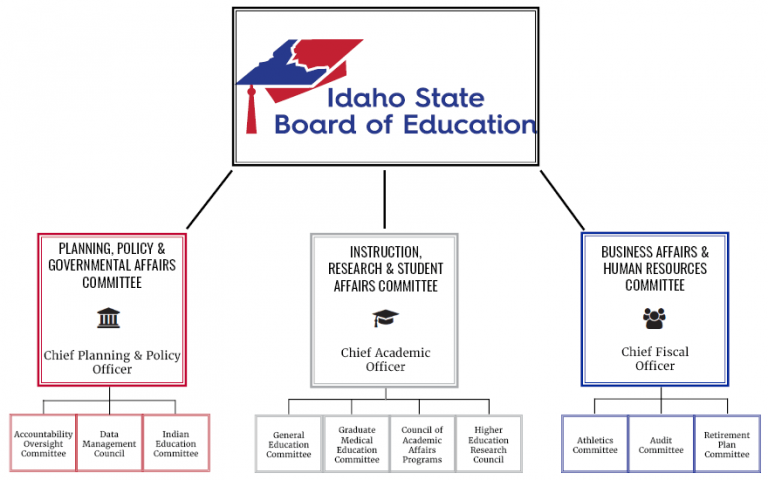Board Committees
The Internal Organization of the Board of Education
The board is granted authority to self-organize in the execution of its duties. It currently has eight appointed committees which meet, confer, and report regularly. The procedural guidelines for Board committees appear in the bylaws of the Board Governing Policies and Procedures.

Planning, Policy, and Governmental Affairs
Instruction, Research, and Student Affairs
Business Affairs and Human Resources
The Business Affairs and Human Resources (BAHR) Committee is a standing committee of the Board. It is responsible for performing work pursuant to Board policy and receipt of delegations from the Board.
Audit, Risk and Compliance Committee
Council on Academic Affairs and Programs
General Education Committee
Data Management Council
The Idaho Data Management Council (DMC) is a council established to make recommendation on the oversight and development of Idaho’s Educational Analytics System (EASI) and oversees the creation, maintenance and usage of said system.
Experimental Program to Stimulate Competitive Research in Idaho
The primary object of the Experimental Program to Stimulate Competitive Research in Idaho (EPSCoR) is to stimulate research in niche areas that can become fully competitive in the disciplinary and multidisciplinary research programs of the National Science Foundation and other relevant agencies.
Higher Education Research Council
The Higher Education Research Council (HERC) is responsible for implementing and administering the Board's higher education research policy and the grant programs created by it. These programs are designed to stimulate competitive research at Idaho's institutions.
Indian Education Committee
The purpose of the Idaho Indian Education Committee (IEC) is to advocate for American Indian students, act as an advisory body to the State Board of Education and the State Superintendent of Public Instruction, and serve as a link between the five Idaho tribes. The mission of the Committee is to create the conditions for and support of the efforts of raising the bar and eliminating the academic achievement gap.

